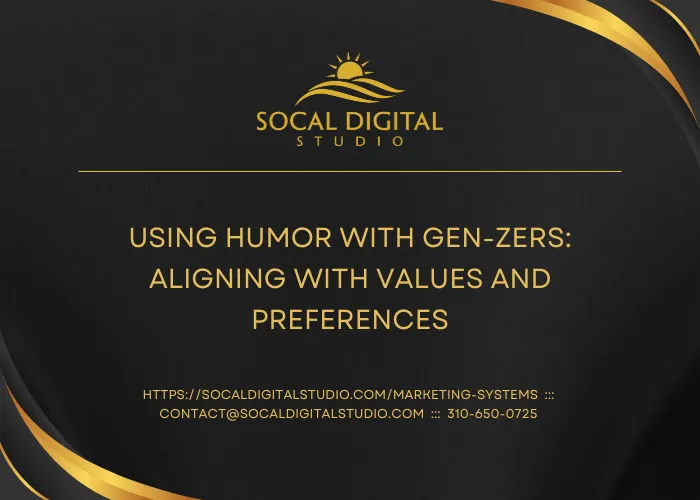PROPELLING SUCCESSFUL BUSINESSES
Actionable Best Practices

Using Humor with Gen-Zers: Aligning with Values and Preferences
"The most interesting information come from children, for they tell all they know and then stop." - Mark Twain
Introduction
Generation Z, born between 1997 and 2012, is the first generation to grow up with the internet and social media as integral parts of their lives. They value authenticity, inclusivity, and social consciousness. Humor that resonates with Gen-Z often includes elements of digital culture, irony, and self-awareness.

Strategies for Using Humor Effectively
Embrace Digital Culture and Memes: Gen-Zers are deeply immersed in internet culture. Humor that incorporates popular memes, trends, and digital language can resonate well with this audience.
Example: Brands like Wendy’s and Netflix frequently use memes and internet humor in their social media posts. Wendy’s witty Twitter comebacks and Netflix’s meme-driven content effectively engage Gen-Z by speaking their language.
Authenticity and Self-Awareness: Gen-Z values brands that are genuine and self-aware. Humor that acknowledges and embraces the brand’s identity and flaws can build trust and relatability.
Example: The fashion brand ASOS uses self-aware humor in their marketing, often poking fun at their own industry. Their light-hearted approach to fashion resonates with Gen-Z’s desire for authenticity.
Inclusivity and Social Awareness: Gen-Z is highly attuned to social issues and values inclusivity. Humor that aligns with these values and avoids offending marginalized groups can be powerful.
Example: Ben & Jerry’s uses humor in their campaigns while also addressing important social issues. Their witty, socially conscious content appeals to Gen-Z’s values and sense of humor.
Interactive and Engaging Content: Gen-Z enjoys interactive and engaging content, such as TikTok challenges, memes, and short, funny videos.
Example: Chipotle’s successful use of TikTok challenges, like the #GuacDance challenge, engaged Gen-Z users by combining humor with interactive content. This approach not only entertained but also encouraged user participation and brand engagement.
When Humor Alienates Gen-Zers
Conversely, humor can alienate Gen-Zers if it appears inauthentic, insensitive, or out of touch with their values and culture. Here are some common pitfalls:
Inauthenticity: Gen-Z has a keen sense for authenticity. Humor that feels forced, insincere, or pandering can backfire.
Example: Brands that try too hard to use internet slang or memes without understanding them can appear cringeworthy. Pepsi’s attempt to co-opt social activism in their ad featuring Kendall Jenner was seen as inauthentic and exploitative, leading to a major backlash.
Insensitive or Offensive Content: Gen-Z is highly sensitive to social issues. Humor that is perceived as offensive or dismissive of important issues can alienate this audience.
Example: A brand that uses humor to trivialize mental health, gender issues, or racial matters risks severe backlash from Gen-Z, who are vocal about their support for social justice and equality.
Ignoring Diversity: Gen-Z values diversity and inclusivity. Humor that fails to represent diverse perspectives or that perpetuates stereotypes can be off-putting.
Example: Ads that rely on outdated stereotypes or fail to include diverse characters can alienate Gen-Z. For instance, a campaign that only features one type of person and overlooks diversity might be seen as exclusionary and out of touch.
Being Out of Touch with Digital Trends: Humor that misuses or misunderstands internet culture can come across as awkward and out of touch.
Example: A brand attempting to use TikTok trends without understanding the platform or the nuances of the trends can appear disconnected. Misusing popular memes or slang can make the brand seem like it’s trying too hard to be relevant.
Conclusion
Humor can be an effective tool in marketing to Gen-Zers if it aligns with their values and preferences. Embracing digital culture, maintaining authenticity and self-awareness, promoting inclusivity, and creating interactive content are key strategies for resonating with this generation. On the other hand, inauthentic, insensitive, or out-of-touch humor can alienate Gen-Zers and harm a brand’s reputation. By understanding and respecting the values and culture of Gen-Z, brands can create humorous content that engages and connects with this influential demographic.
Disclaimer and Caution on General Characterizations and Generational Profiles
While general characterizations and generational profiles can offer valuable insights into common trends and behaviors within specific groups, it is important to approach these profiles with caution.
Usefulness
Generalizations can help in understanding broad patterns and tendencies, facilitating the development of targeted marketing strategies, communication methods, and policy-making.
Generational profiles, such as those of Baby Boomers, Gen X, Millennials, and Gen Z, can provide useful frameworks for understanding different perspectives, values, and preferences that may influence behavior and decision-making.
Pitfalls
Overgeneralization: Not all individuals within a group or generation will fit the characterized mold. There is significant diversity within any demographic, and individual differences can be substantial.
Stereotyping: Relying too heavily on generalizations can lead to stereotyping, which can perpetuate misconceptions and biases, resulting in unfair treatment or exclusion of individuals who do not conform to the stereotype.
Context Ignorance: General characterizations may overlook important contextual factors such as cultural, socio-economic, and geographical differences that influence behavior and attitudes.
Inaccuracy: Profiles can be based on outdated or incomplete data, leading to inaccuracies that misinform decisions and strategies.
In Sum
While general characterizations and generational profiles are useful tools for gaining a broad understanding of different groups, they should be used judiciously. Always complement these insights with specific, contextual information and remain vigilant against the risks of overgeneralization and stereotyping. A nuanced approach that respects individual diversity and avoids assumptions will yield more effective and respectful outcomes.
We Help You Effectively Use Humor to Align with Your Brand
Schedule a free impact and strategic session with us by CLICKING HERE and uncover opportunities to increase your website's traffic and engage with your target audience more meaningfully with tempered use of humor and storytelling so they will want to do business with you.
Recommended Reading: "The Content Beast" by Geoffrey Klein.

SUBSCRIBE TO THIS NEWSLETTER TO STAY IN THE KNOW
Please contact us with topics you would like us to cover
Dominate with Our Affordable All-in-One Marketing System
SoCal Digital Studio's Advanced All-In-One Marketing System is built to help local businesses attract, engage, convert, and retain customers with speed and consistency. It automates the communication that is essential to a business' success and continuing growth. Request a free marketing audit to uncover weaknesses and use SoCal Digital Studio's Marketing System to not only compete, but dominate the market.
All-in-One Marketing System
Leverage Powerful Marketing Tools and Sales Funnels to Nurture and Convert Customers at an Affordable Price
Our marketing system has it all and allows you to (1) capture leads via landing pages, forms, calendars, and inbound phone calls; (2) message leads via phone calls, SMS, emails, and Messenger; and (3) close leads with built-in tools for payments and analytics (including call tracking).You can also create landing pages and funnels, set up automated follow-up campaigns, schedule appointments, fine-tune marketing and sales processes, and manage all of it so nothing slips between the cracks in your dedicated marketing system.
Stellar Package
Monthly Subscription
12-Month Subscription is $4970
One-Time Set-Up Fee Varies
$297
Full System Access
5,000 Contacts
1,500 SMS or Calls
15,000 Emails
1-3 Team Members
Galactic Package
Monthly Subscription
12-Month Subscription is $6970
One-Time Set-Up Fee Varies
$497
Full System Access
7,500 Contacts
3,000 SMS or Calls
30,000 Emails
4-10 Team Members
Cosmic Package
Monthly Subscription
12-Month Subscription Is $9970
One-Time Set-Up Fee Varies
$697
Full System Access
10,000 Contacts
4,500 SMS or Calls
45,000 Emails
11-15 Team Members
